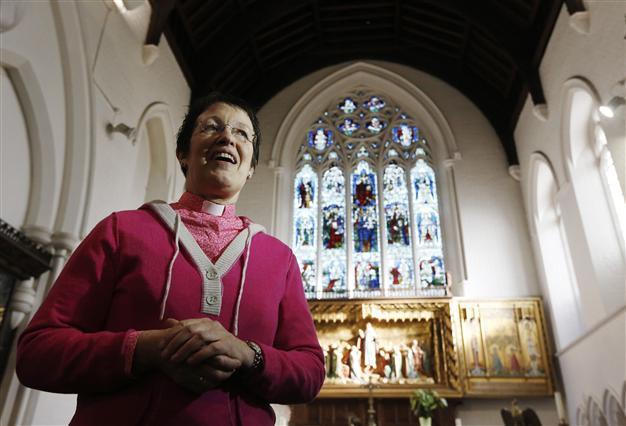Church of England to decide on women bishops
LONDON - Agence France-Presse

The Reverend Jane Morris speaks during an interview at St Gabriels Church in Cricklewood, north London November 18, 2012. REUTERS Photo
The Church of England's legislative body was kicking off Monday a three-day general assembly which will vote on whether to allow women bishops, in its biggest decision for 20 years.The 470-strong General Synod was to vote Tuesday on an issue which has split traditionalists and liberals, two decades after England's established state church backed the introduction of women priests.
Women now make up a third of the church's clergy but commentators say the vote could nonetheless be tight, with The Times newspaper saying it was "on a knife-edge".
The meeting of the General Synod, which is formed of three houses -- bishops, clergy and laity -- is taking place at Church House, in the shadow of Westminster Abbey in central London.
Rowan Williams, who as Archbishop of Canterbury is the Anglican church's spiritual leader, backs the legislation.
Williams, who steps down in December after 10 years in the role, will be replaced by the Bishop of Durham Justin Welby, who also supports the change.
If approval is given, the legislation will go to parliament before being signed off by the head of state Queen Elizabeth II, who is also the Church of England's supreme governor, paving the way for the first women bishops in 2014.
The Church of England, which separated from the Roman Catholic Church in 1534, is the mother church of the 80-million-strong worldwide Anglican Communion.
The communion's first woman bishop was appointed in the United States in 1989 and there are women bishops in Australia, Canada, Cuba, New Zealand and South Africa.
More than 1,000 Church of England members, including bishops and senior clergy, signed a letter in The Independent newspaper on Monday urging the Synod to vote in favour of women bishops.
"We believe wholeheartedly that this is the right thing to do, and that the time is now right to do it.
"We believe that we must now show clearly that we no longer believe women to be inferior to men." They acknowledged that the legislation "represents enormous compromise from all sides".
In a letter to The Times last week, 325 clergy opposed to the change said they accepted that a majority wanted to introduce women bishops but doing so "will lead irrevocably to deep fractures appearing within the Church".
"The Bible teaches -- and the Church has traditionally understood -- that men and women are equal before God and yet have different, complementary, roles in the Church," they said.
















